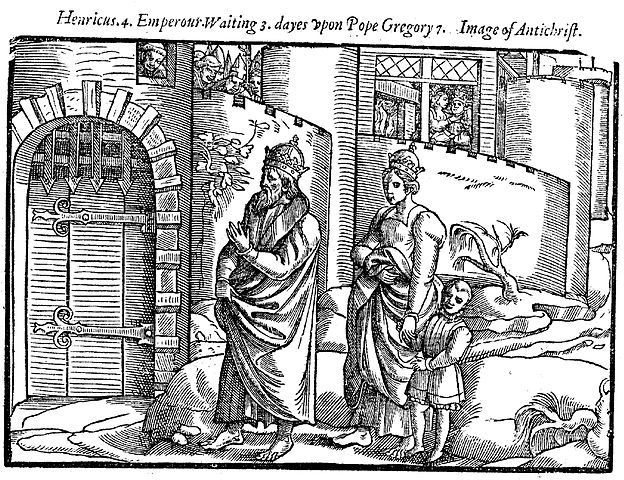 |
| Henry IV - King of Germany |
Henry IV was the eldest son of Henry III of Germany, from the Salian (Frankish) dynasty, and Agnes de Poitou, the daughter of William V of Aquitaine. He was born in 1050 and at the age of three was elected by the German assembly of nobles as his father’s heir to the throne—a succession not guaranteed in the German kingdom by birth.
In 1054 the archbishop of Cologne crowned the four-year-old Henry, and in 1056 his father died suddenly. Henry’s mother was appointed regent, a short-lived position thanks to Archbishop Anno of Cologne, who took the regency away from her and assumed power.
Anno and his cohorts spent the next decade plundering the royal coffers for their own benefit, a situation that ended in 1066 when Henry, having reached maturity and assuming his position as king, dismissed them. Also in 1066 Henry married Bertha of Maurienne, the daughter of Count Otto of Savoy, with whom he fathered five children.
  |
Since 962 when Otto I of Germany had assisted Pope John XII in defending the Papal States against King Berengar II of Italy and had been rewarded by being crowned Holy Roman Emperor, the German kings had become the claimants to the Roman imperial throne.
Under Otto I and his successors, the Holy Roman Empire was expected to function as the secular counterpart to the papacy and ensure the unity and protection of Western Christendom. The partnership, however, often resulted in major power struggles between the two entities. In 1075 Pope Gregory VII sought to diminish imperial power by removing the right of secular rulers to appoint clerics.
Lay investiture, as the practice is called, benefited rulers financially as individuals would pay to obtain these appointments. This is referred to as simony and considered sinful by the church. The fact that rulers could appoint loyal individuals who would act in their favor was also a major benefit.
In his Dictatum Papae (Papal Dictum), Gregory declared that the sanctity of the pope was inherited from St. Peter, whom Christ had charged with establishing the papacy in Rome. Therefore, all Christians were subject to the pope, and only he could appoint or depose clerics and exercise supreme legislative and could judicial power. With this began what is known as the Investiture Controversy.
 |
| Henry IV with his wife and son |
To retaliate against the pope for having tried to undermine his authority over the German Church, Henry IV nominated his own clerics in Germany and also in Milan, Fermo, and Spoleto on Italian soil. In 1076 he convened an assembly of church officials at Worms in which the pope was deposed and where Henry called for his abdication. Gregory responded by excommunicating Henry, declaring him deposed, and releasing his subjects from allegiance to him.
The German nobles embraced Gregory’s actions. They were interested in limiting absolutist imperial power and needed an excuse to continue a rebellion that had begun at the First Battle of Langensalza in 1075, where Henry had defeated the Saxons. In 1077 they elected Rudolf of Swabia as antiking, initiating a civil war that was to last until 1122.
Henry had no choice but to beg for Gregory’s forgiveness. He traveled to Canossa in northern Italy to meet with the pope and there he stood in the snow for three days until the pope finally took pity on him and lifted his excommunication. In 1080 however Gregory renewed Henry’s excommunication and recognized Rudolf of Swabia as the rightful king of Germany.
   |
Henry responded by convoking a council of imperial bishops at Brixen in which Gregory once again was deposed and Guibert, whom Henry had appointed archbishop of Ravenna, was elected antipope Clement III. In the meantime, Rudolf of Swabia died and his supporters elected Count Herman of Salm as his successor.
After several failed attempts to enter Rome, Henry was finally able to do so in 1084. He ran Gregory out of the city and installed Clement III on the papal throne. As a reward, Clement crowned Henry Holy Roman Emperor. Four years later, Henry deposed Herman of Salm, but his support of the antipope turned his family against him, because they believed that he was jeopardizing the monarchy. In 1104 Henry’s son Henry V rebelled, had his father imprisoned, and forced him to abdicate in the following year. Henry escaped, only to die in Liège in 1106.
The Investiture Controversy continued under the reign of Henry V. In 1110 Henry V invaded Rome; arrested Pope Paschal II, who had been elected in 1099; and forced him to reinstate the secular right to appoint church officials. Paschal agreed and was given no choice but to crown Henry V Holy Roman Emperor.
In 1116 however he renewed the prohibition of lay investiture, leaving the dispute unresolved until 1122 when, after heavy negotiations, Pope Calixtus II and Henry signed the Concordat of Worms, which declared that the election of bishops and other members of the clergy in Germany would take place in Henry’s presence, without simony or violence.
Henry would only grant secular authority and act as a judge between disputing parties, while the pope would confer the sacred authority. In 1123 Calixtus convoked the First Council of the Lateran. In front of 300 bishops and more than 600 abbots, he ratified the Concordat of Worms and abolished the Holy Roman Emperor’s ability to interfere in papal elections. With this, Calixtus secured the freedom of the church from imperial intervention.